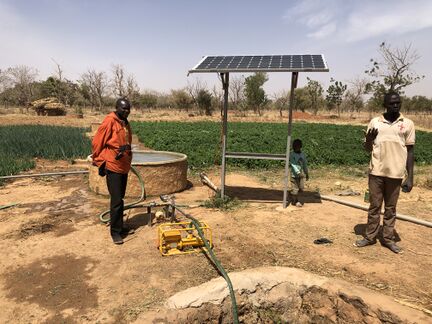Solar Powered Irrigation in Mozambique : Recommendation
Introduction
This article is part of the publication on Solar irrigation market analysis in Mozambique which looks at the feasibility of introducing individual solar-powered irrigation packages at small scale enterprise level in Mozambique.
Recommendations and Opportunities
To increase access to solar powered irrigation for the target group of GBE, i.e. small-scale farmers in Mozambique, solutions should provide an answer to the three main barriers, i.e. the technical, commercial and financial aspects. The key to sustainable scaling is to increase access to integrated SPIS solutions by making solar irrigation support initiatives more inclusive.
An experienced key expert recommended that a sustainable support initiative for solar irrigation should start with a selection of feasible areas, followed by the identification of key partners, farmers and associations that have experience with irrigation. Next to this, training local technicians should be part of any solar pump installation to solve minor problems when necessary. A third recommendation by the respondents, which is in line with observations from the World Bank[1], is the need to coordinate efforts to promote solar irrigation, in order to avoid market distortion or counterproductive initiatives and learn from each other.
To increase the technical scope for solar pumps, it is recommended to increase access to water. This is because the main sources currently used for solar irrigation: perennial rivers and deep boreholes, are not accessible for most farmers. Low-cost technologies to drill or dig wells could be promoted, as well as technology that allows submersible pumps to be used in ordinary open wells (e.g. the so-called pump jacket recently launched by Lorentz together with the PS2-100 pumps).
To increase sustainability, it is necessary to invest in the development of supply chains and local technicians. Chapter 2.3 has shown that the availability of technicians and spare parts at district level is directly linked to a company’s ability to assure rapid repairs. The risk of harvest failure due to pump downtime could severely impact farmers’ capacity to pay back a loan, so available maintenance services are even more critical when providing pumps on a credit basis. Training of technicians, advisors and users is indicated as the key to success and sustainability. Key experts from the private sector said that even though solar irrigation can be scaled easier with commercial farms with means to invest, solar irrigation is also a sustainable option for donor-funded community projects. This is because solar-powered systems tend to have both a longer technical lifespan and a longer lasting social durability than fossil fuel powered systems as no running costs are involved.
In order to reduce the financial gap for farmers to start solar irrigation, a dual strategy including both subsidies and inclusive credit mechanisms is recommended. Subsidies could be justified by the fact that benefits on the environment are in the interest of the global community. Subsidies can be provided by the government, as has been done in India and is now also planned by various governments in West Africa.
Alternatively, donors can engage with the financial sector or provide direct support to suppliers, respectively providing them with guarantees or the necessary start capital to offer pumps on a credit base. Chapter 2.3 showed that the main reason for solar pump suppliers to not currently provide finance solutions to their customers is the lack of cash flow to pre finance the pumps (60%). Providing start-up capital and implementation support for PAYGO solutions is recommended in particular because of the low administrative requirements and the direct link that is established between the farmer and the supplier, sharing a mutual interest in a well performing solar pump and irrigation system.
Finally, the involvement of subsidies and other donor support mechanisms related to solar irrigation provides a way to combine multiple purposes, such as promoting renewable energy and increasing opportunities for youth or women. Female farmers in Mozambique have less access to finance, markets and technical innovations including irrigation systems[2]. Targeting vulnerable groups increases the base, justification and resources for financial support mechanisms. The opportunity of targeting female farmers was very well understood by Sunculture, who named their 5000 solar pump partnership in West Africa : “Women and Solar Entrepreneurship”[3]. Hence, when private sector and donor priorities find common ground, the development of inclusive supply chains can accelerate considerably.
Further Information
- Mozambique Off-grid Knowledge Hub
- Solar Powered Irrigation in Mozambique : Market Landscape
- Solar Powered Irrigation in Mozambique : Market Share
- Solar Powered Irrigation in Mozambique : SPIS Support Initiatives
- Solar Powered Irrigation in Mozambique : Barriers
Reference
This article is part of the publication written by *****, Practica Foundation
- ↑ https://documents1.worldbank.org/curated/fr/594061554084119829/pdf/Mozambique-Energy-for-All-ProEnergia-Project.pdf
- ↑ http://www.mgcas.gov.mz/st/FileControl/Site/Doc/4021perfil_de_genero_de_mocambique.pdf
- ↑ https://www.edf.fr/groupe-edf/espaces-dedies/journalistes/tous-les-communiques-de-presse/edf-accelere-sur-le-marche-off-grid-en-afrique-en-misant-sur-une-nouvelle-offre-et-les-competences-locales




















